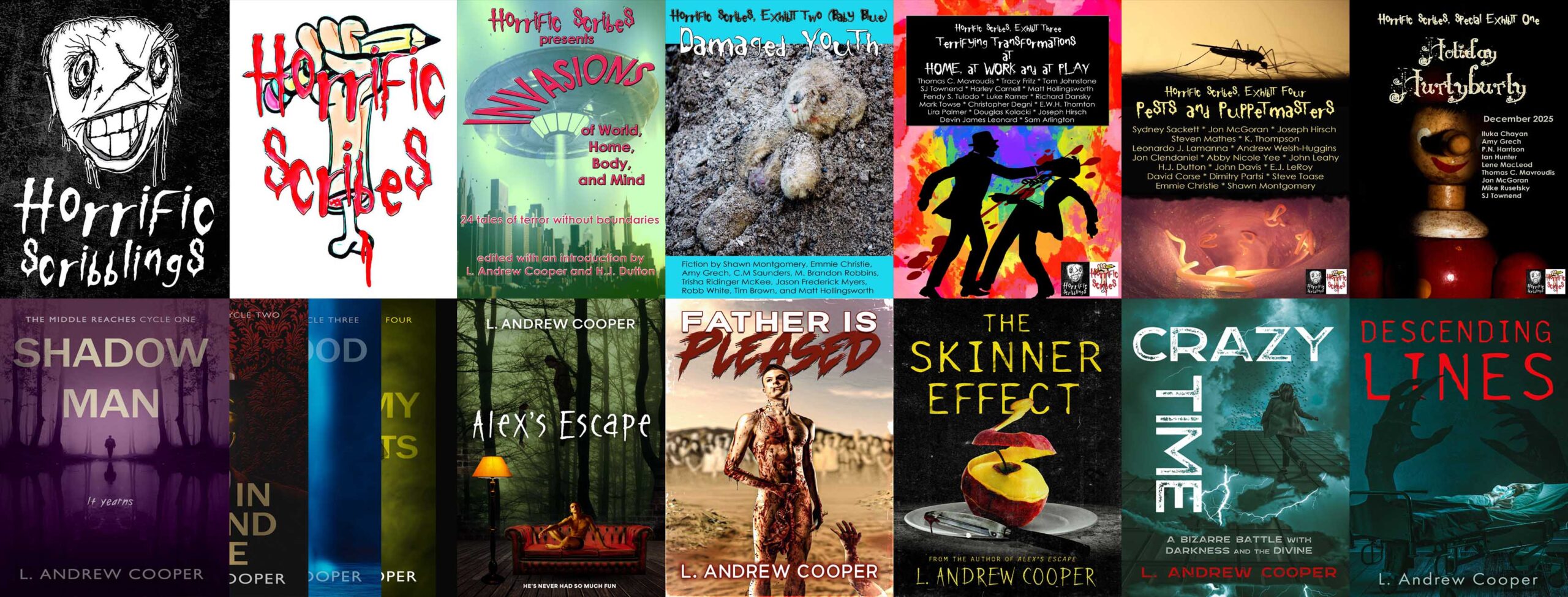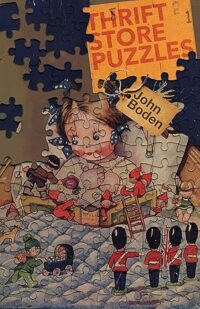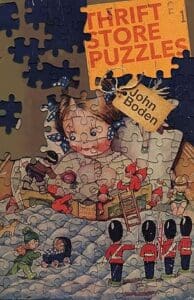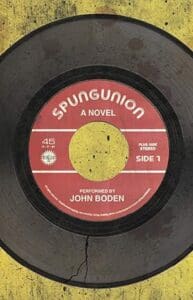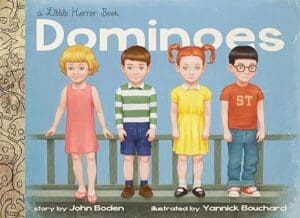A day after its launch, elegant horror author John Boden is here to discuss his novella Thrift Store Puzzles, touching on the terrors of time, aging, and many kinds of loss–oh, and vampires.
Thrift Store Puzzles
Ken Allenwood is a man being devoured from the inside out, one memory at a time. A once-famed horror writer who now spends his days in an elder care facility waiting for the breath that will be his last and hoping he’ll retain at least some memories from his long and unusual life, Ken is over 130 years old… or is he? Has the unraveling fabric of his mind tangled with the threads of his fictive endeavors?
Elijah is a boy who adores all things spooky, a boy who spends the bulk of his time alone, his single mother juggling jobs to keep a roof overhead and food in their bellies. Eli occupies his days hanging out at the home across the street with his uncle/pal, Tierny, one of Mr. Allenwood’s many caregivers, as well as with Allenwood himself, their afternoons filled with cheesy scary movies and the old man’s recollective stories (while he is still able to tell them).
Then a change comes to the little town of Cordry. The killings are vicious and devoid of pattern, almost. When Elijah tells Ken about them, the old man grows fearful and decides to use his unreliable windows of focus to help his friends figure out what is going on and who or what is behind the murders.
A monster has come to roost in their midst. A creature that craves blood and possibly much more, inheritance of a sort, acknowledgment. A monster from the very dark recesses of Allenwood’s mind, a horror very old and very bitter. The things we create have a tenacity, a stubborn strength and a very vicious bite.
The Interview
1. The Mysteries and Horrors of Time. Early in Thrift Store Puzzles, a character reflects that time is “all we really have,” a thought I find particularly terrifying in the context of a story with a lead character losing time—losing memories, losing track of his place on a timeline—due to senile dementia. What is your book’s philosophy of time? Would you say time is one of the monsters, perhaps even the primary monster, in your story? Why or why not? For Elijah, Ken’s extreme age—whatever the actual number may be—seems fascinating. What is the fascination? Is it morbid? Why or why not?
JB: Time is always a monster, isn’t it? It’s that faceless thing we’re given a born-in awe/fear of that has no physical face to turn away from, a thing that we see, always, the crimes committed by—the grisly afterstains, but we are absolutely powerless against it. I’m not exactly sure I’d say it is the primary monster in TSP… that is the dementia, which is a monster that the monster of time must surely fear. It eats the crumbs that time allows us, the memories and lessons learned. That’s all it does really. It erases and eats, and I find that tragically terrifying, and while I wish it weren’t so, I’ve seen it up close and watched the husks it leaves. Losing loved ones twice… I purposefully placed the characters here on different bases on the time playingfield. Ken, regardless of actual age, is rounding third whereas Elijah is running to first, and the whole game in his future. It is a fascination but not a healthy one, kinda more like when you encounter someone or something that gives you that feeling, and you warily keep an eye on them from then on, just in case.
2. Writer Stories I: Horror’s Writer/Writing Fetish. Thanks largely to Stephen King (but the tradition goes back much farther), the “writer story,” a tale with a writer at its center, is a popular subgenre in horror, and since Ken both is a writer and his writing is important to the story, Thrift Store Puzzles fits right in. Why is this subgenre so popular, particularly in horror? What drew you, as a horror writer, to craft a tale about a horror writer? In what ways might your writing about writing make your book self-reflective? How might this self-reflective dimension increase the book’s dark-and-scary factor?
JB: As with a lot of my works, it was accidental. I’m not very normal in the way I do things. With my books Spungunion and Snarl, I came up with the final scenes first and then wrote the story to get there. With this one, I set out to write a Boden-version of a vampire novel. That opening was to be the opening of that. During the period of time I was working on it, I was watching dementia use its claws on my father-in-law, who was a great and lovely man. And the more that went on, the more this new trajectory started to reveal itself. The character of Tierny was named for a friend who was going through the very same horrible situation with his partner, and my heart broke for him… as it breaks for everyone all the time. Self-reflective is just how I write, always. If I don’t feel about it–how do I expect others to feel it? If I peel back my skin, you’re more likely to be okay with your own flaying. We all cut ourselves to ribbons a hundred times a day and bleed quietly under our uniforms and suits. I once had a conversation with the late Dallas Mayr (Jack Ketchum) and he told me to write what I knew, and I couldn’t go wrong. It was, to date, the best advice I’ve gotten, and I clutch it as treasure. I put so much of myself, my history and life, into my stories, oft presented as fiction, but the authenticity it adds can’t be faked. I don’t think.
3. Loneliness. My emotions got unusually involved with your characters, each of whom—Ken, Elijah, Tierny, even the monster—struggles with a profound loneliness. Why the widespread loneliness in this fictional world? With Elijah, Tierny, and Ken, we see man in different stages of life. How, in your novella, does the loneliness of youth compare the loneliness of adulthood and the loneliness of old age? To what extent are sadness and isolation constants that go along with the predation of time?
JB: Everyone is alone, even when they’re with people. Even when they’re loved. Elijah pines for the inclusion he feels he’s missing out on with friends his age, not quite realizing a lot of his exile is self-imposed. Tierny is much the same but for wholly different reasons. A closeted man in a very small town must navigate carefully, at least that was how I saw it in the 80s when I was an early teenager and began to suss out how things work. Even then, I recall thinking about how horrifying it must be to have to sneak and hide yourself almost always. Sadly, not much has changed in a lot of the world. I felt it was important to paint Tierny as a composite of some older friends I had as a teenager. Not one single time was sexuality ever discussed. I knew they were different but didn’t care. Friends are friends are family. And that’s why I chose to handle Tierny’s “loneliness” as I did. Loneliness is just time again in a fancier suit.
4. Poetic Prose. Whoever your bio (below) refers to who said your writing style stands out deserves repeating: your style has unusual, often poetic qualities, especially as you delve into your characters’ inner struggles. How would you describe the style you use to create the atmosphere and mood(s) of Thrift Store Puzzles? What techniques or approaches do you use to make the words on the page feel right? Does your style change much from work to work, or should readers expect the writing in Thrift Store Puzzles to be very similar to that in your other tales? Thrift Store Puzzles is very new at the time we’re doing this interview: what about it suggests steps forward in your development as a writer?
JB: Heh, I have been asked about my style so many times, and I always feel like a dick with my answer. It’s just how it happens. I have a head full of words–I’ve been stuffing that reservoir since grade school, and I love nothing more than playing with them and putting them together in weird ways, offbeat combos that make them mean entirely unique things they really ought not. I don’t put much thought into it. I just (when I’m writing) start typing and see what happens. The earliest stuff I wrote was poetry. I have never forgotten how it feels to compose that way, and so it’s how I approach my fiction as well. The first thing I ever had published (of my solo work) was a chapbook called Dominoes, which was made to resemble a children’s book but was filled with poetic shards of prose fiction pieces all concerning the end of the world in a myriad of ways. I also used poetry as interlude chapters for the novella Snarl, in which the main character is a guy who likes to write poetry but lacks the courage to send it into the world. So all of that is to say, I don’t really know why I write the way I do, but I consider myself fortunate that folks seem to like it and that it is has become somewhat of a signature style. One fella told me once I write like Ozzy vocals. The first word of the first verse sung and you know. I’m a huge music nerd, so I dug that.
5. Writing Perspectives: Boy, Man, Monster. As we’ve already begun to discuss, you reveal the thoughts and feelings of characters at different stages of life as well as of a monster whose very existence is a mystery. While they have feelings like loneliness in common, each perspective is distinct. What about the perspectives primarily distinguishes Elijah from Tierney and from Ken (and various vice-versas)? What’s the significance of the commonality between the monster and the protagonists? Loneliness is a defining characteristic of one of history’s most famous monsters—Frankenstein’s Creature—who is sympathetic despite his murderous rampages. Do you want readers to sympathize with your monster? Why or why not?
JB: I’m not sure I want sympathy for the monster. I mean, most monsters are owed a sliver of sympathy, and The Mouth is sure no different. I could go into why, but it would be spoilery, so I won’t aside from saying the commonality between the monster and the other characters is intentional. This particular monster is so metaphoric in a lot of ways that it being somewhat composite in many ways was unavoidable. Almost as though it were a depository where all that Ken lost, all that Tierny had to suffocate to survive, and all that Elijah had yet to experience, all of that languished and congealed and germinated into being. It could almost be said that, dementia/monster aspects aside, the three main fellas in TSP could just be one man in those three distinct phases of his life. Even allowing the inclusion of the dementia that would still hold, because that reduces one to almost mental infancy at the end, which is yet another of the things that make it so cruelly tragic.
6. Writer Stories II: Creative Forces. Questions about the creative power of horror fiction, which I’ve traced back to the beginning of the Gothic in the eighteenth century, tend to become major story elements in some writer stories, such as King’s The Dark Half and your new novella. In short, how might fictive horrors become “real?” The description of your book (above) offers Ken’s dementia as a possible answer: how literally does dementia change “reality” by removing Ken’s ability to differentiate between what he has experienced and what he has written? How do you feel about the possibility of losing the barrier in your brain that separates what you’ve imagined from what you’ve lived? Your book’s description suggests that the power of Ken’s writing goes even further: the monster killing people in reality may have sprung from his mind. What does this fiction about fiction possibly having this power say about the actual power of fiction? Do you think fiction actually creates monsters? Why or why not?
JB: Fiction definitely creates monsters, not in that panic-way that those who bemoan the dangers of horror movies and violent games bemoan, but in that fiction is a creature born of emotions. Thoughts drenched in love/fear/unease/remorse/grief and a million other feelings we can feel–crack your knuckles, crack open your brain, and hit the keyboard, and a monster will surely be loosed, with disregard of genre. You have brought the creature to life. The monster in TSP isn’t due to Ken’s dementia, that was more of a key left in the lock of a door. The door is opened easily, but can you claim someone broke in? Not really. Dementia left the key in Ken’s brain. He is no longer aware of that lock or maybe even the door… but our baddie found it. I am personally terrified of losing control of my thoughts and retention of memories. My memories are my treasure. So many relatives and friends have passed on, and all we have left are those memories, and they’re priceless. I’m not going to plod on with this answer much more as it gets me weepy, and I’m not up for that right now. I apologize.
7. Masculinity and Intergenerational Relationships. Elijah’s loneliness is at least in part what drives him to the retirement home where he befriends Tierny and Ken, men old enough to be his father and (possibly great- or great-great-) grandfather. Beyond mere company, what draws Eli to friendship with these older men rather than with kids his own age? That they’re possible father figures only begins to answer, I think—what specific benefits does their friendship offer the boy, and what, in turn, does the boy’s friendship offer them? What is he looking to learn about becoming a man, and what are they able to teach?
JB: He is related to Tierny so that friendship is kinda built-in, and I assume it was the catalyst that brought the boy initially hanging about the home. Then his love of all things horror was piqued when he found that a former horror writer was a patient there. His lack of friends his own age stems from several things, his awkward demeanor from being on his own so much, his smallness for his age, his preoccupation with subjects that most boys his age just aren’t into. In almost every way, Elijah was me at that age. He relishes the fact that these two adults treat him as an equal almost, Tierny out of relative respect being related, and Ken just because that’s how he is. But to Elijah that’s the world. I never really mention Elijah’s father’s absence because, as seems to be the case more often these days than when this was set, that’s just the way it is. More and more young people have question marks on the branches of their family trees, and I’m not really being judgmental, it’s how it is. So people build their own family, and friends are often afforded the same level of reverence as blood kin. And I’m completely okay about that. Someone once said that rarely do members of the same family grow under the same roof… something like that. The benefits of the friendships with the older men are simple, a feeling of acceptance and a warmth born of honest engagement.
8. Relating to the Vampire. Though the v-word describes your monster at times, you make clear the blood-craving entity is very unlike what people tend to expect from vampires. Without giving away too much, how would you describe your monster? Why did you tie him to the vampiric while being very careful to distinguish him from the vampire mainstream? Although these films are very different, your book’s connection of vampiric themes to themes about old age made me think of The Hunger (1983) and Cronos (1992). If you’re aware of these films, would you be willing to draw a line connecting them and your work? What do you think is your book’s major contribution to the vast world of vampire-related fiction?
JB: I initially set out to write a vampire book, more traditional, but, as is always my way, I fell from the path, and things got weirdly twisted. The Mouth is vampiric in that its driving force is hunger and it seeks to cement its existence through what it devours. Does it subsist solely on blood? Does it look dapper in a cape and in moonlight? No, The Mouth is an amalgamation of mountain magic/possession and plundering the trunk of an old man’s memories for clothing to wear. It’s an entity that on its own is bleak and scary, but once it shrouds itself in the vampiric memories of Ken’s fictions, it feels it’s found its identity. The connections to Ken’s dementia, while purposefully acknowledged, are not wall-bearing really. I’m kind of a “here’s a fistful of ideas I’m gonna throw in here” and we see what sticks and what just hangs there. I like to think The Mouth has as much of a place in the annals of Vampiric monsters as Christine (totally a vampire!) and the house in Burnt Offerings. Aging, as I rambled about time earlier on, is always a monster. Often THE monster. And it’s the one you’ll never outrun.
9. Coming of Age. Elijah seems to be your book’s heart. If this story is primarily his, is he coming of age, and is your story therefore a coming-of-age story? What does your answer mean for Eli and for your story? What’s the significance of growing up, or at least trying to, in a horror story? Why might the horror genre provide particularly handy tools for writing about the experiences of childhood?
JB: My interpretation of “Coming of Age” is most likely a bit different from most. I always look at it, if the character learns, then comes to settle into his place with some idea of where his trajectory now aims, then yes, it’s CoA. By that definition all of my books fit, as do many other works, and they don’t have to feature children in the role. Growing up is one of the scariest things in life, and we never really stop doing it. I feel like Stirring the Sheets by Chad Lutzke was a fabulous CoA that happened to be about an aging widower. The heart of the story is Ken, but without the circulatory system that is Elijah… bringing him the much-needed oxygen and blood (from the outside world) without which he’d assuredly shrivel and die. There are CoA books in all genres, but they do seem to wear the shoes well with horror. The only thing I can hang that on is that most of us fell in love with horror when we were children and have never really allowed that part of us to grow up. I know when I watch a favorite old scary movie or see a neat old monster toy when I’m out antiquing. The little me with the skinned knee and ripped jeans, the dirty sneakers (probably still untied), and the shirt with the peeling Frankenstein iron-on on gets excited and pushes to the front of my brain. That’s happens to everyone, right?
10. Access! How can readers learn more about you and your works (please provide any links you want to share)?
JB: I don’t have an actual website. I’ve attempted them in the past and as recently as last year I tried the Substack thing and then left it to starve like the others. I can be found on most social platforms. Just search my name, and you’ll find me. The best place to see what books I’ve got out there through a variety of publishers would be my Amazon author’s page, and I know lots of folks loathe dealing with the Zon but you could look and see what I have out and about. I check Facebook and Bluesky daily.
About the Author
John Boden was mostly raised in the mountains of Pennsylvania, in the small town of Orbisonia.
He is a bakery manager by trade and finds a regular sleep schedule overrated.
He currently resides with his beautiful wife and two sons in a house sweetly haunted by the ghost of a beautician named Darlene. He likes collecting lots of things and won’t usually shut up about it.
His writing is fairly well received and has been called unique in style.
His work has been published in the form of stories in several anthologies and as novellas. He is slowly working on his first novel.
